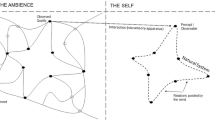Abstract
Reductionism has dominated science and philosophy for centuries. Complexity has recently shown that interactions—which reductionism neglects—are relevant for understanding phenomena. When interactions are considered, reductionism becomes limited in several aspects. In this paper, I argue that interactions imply nonreductionism, non-materialism, non-predictability, non-Platonism, and non-Nihilism. As alternatives to each of these, holism, informism, adaptation, contextuality, and meaningfulness are put forward, respectively. A worldview that includes interactions not only describes better our world, but can help to solve many open scientific, philosophical, and social problems caused by implications of reductionism.
Similar content being viewed by others
References
Aerts, D., Apostel, L., De Moor, B., Hellemans, S., Maex, E., Van Belle, H., Van der Veken, J. (1994). World views. From fragmentation to integration. Brussels, Belgium: VUB Press. http://www.vub.ac.be/CLEA/pub/books/worldviews.pdf.
Bar-Yam, Y. (1997). Dynamics of complex systems. Studies in Nonlinearity. Westview Press. http://www.necsi.org/publications/dcs/.
Bedau M. A., Humphreys P. (2007) Emergence: Contemporary readings in philosophy and science. MIT Press, Cambridge, MA, USA
von Bertalanffy L. (1968) General system theory: Foundations, development, applications. George Braziller, New York
Berlekamp, E. R., Conway, J. H. & Guy, R. K. (1982). Winning ways for your mathematical plays. Volume 2: Games in particular. London: Academic Press. http://tinyurl.com/yeplyq.
Chaitin, G. J. (2004). Irreducible complexity in pure mathematics. Arxiv preprint math/0411091. http://arxiv.org/abs/math/0411091.
Gershenson, C. (2002). Contextuality: A philosophical paradigm, with applications to philosophy of cognitive science. POCS Essay, COGS, University of Sussex. http://cogprints.org/2621/.
Gershenson, C. (2007a). Design and control of self-organizing systems. CopIt Arxives, Mexico. http://tinyurl.com/DCSOS2007.
Gershenson, C. (2007b). The world as evolving information. In Y. Bar-Yam (Ed.), Proceedings of international conference on complex systems ICCS2007. http://uk.arxiv.org/abs/0704.0304.
Gershenson, C. (2011). Enfrentando a la complejidad: Predecir vs. adaptar. In X. Martorell & A. Massip (Eds.), Complejidad y Lenguaje (in Press). http://arxiv.org/abs/0905.4908.
Gershenson, C., Aerts, D., & Edmonds, B., Eds. (2007). Philosophy and Complexity. Worldviews, Science and Us. Singapore: World Scientific. http://www.worldscibooks.com/chaos/6372.html.
Gershenson, C. & Heylighen, F. (2003). When can we call a system self-organizing? In W. Banzhaf, T. Christaller, P. Dittrich, J. T. Kim & J. Ziegler (Eds.), Advances in artificial life, 7th European conference, ECAL 2003 LNAI 2801 (pp. 606–614). Berlin: Springer. http://uk.arxiv.org/abs/nlin.AO/0303020.
Gershenson, C. & Heylighen, F. (2005). How can we think the complex? In K. Richardson (Ed.), Managing organizational complexity: Philosophy, theory and application (Chap. 3, pp. 47–61). Information Age Publishing. http://uk.arxiv.org/abs/nlin.AO/0402023.
Gleick J. (1987) Chaos: Making a new science. Viking, New York
Heylighen, F., Cilliers, P. & Gershenson, C. (2007). Complexity and philosophy. In J. Bogg & R. Geyer (Eds.), Complexity, science and society. Oxford: Radcliffe Publishing. http://uk.arxiv.org/abs/cs.CC/0604072.
Kauffman S. A. (2008) Reinventing the sacred: A new view of science, reason, and religion. Basic Books, New York
Mitchell M. (2009) Complexity: A guided tour. Oxford University Press, Oxford, UK
Morin, E. (2007). Restricted complexity, general complexity. In C. Gershenson, D. Aerts & B. Edmonds (Eds.), Philosophy and complexity: Worldviews, science and us (pp. 5–29). Singapore: World Scientific. (Translated from French by Carlos Gershenson).
Neuman, Y. (2008). Reviving the living: Meaning making in living systems (Studies in multidisciplinarity, vol. 6). Amsterdam: Elsevier.
Nydahl O. (2008) The way things are: A living approach to Buddhism for today’s world. O Books, London
Toffler A. (1980) The third wave. Bantam, New York
Vidal, C. (2008). Wat is een wereldbeeld? (what is a worldview?). In H. Van Belle & J. Van der Veken (Eds.), Nieuwheid denken. De wetenschappen en het creatieve aspect van de werkelijkheid. Leuven, Belgium: Acco. http://cogprints.org/6094/.
von Baeyer, H. C. (2004). Information: The new language of science. Cambridge, MA: Harvard University Press. http://www.hup.harvard.edu/catalog/VONINF.html.
von Neumann, J. (1966). In A. W. Burks (Ed.), The theory of self-reproducing automata. Champaign: University of Illinois Press.
Weinberg S. (1994) Dreams of a final theory: The search for the fundamental laws of nature. Vintage, New York
Wilensky, U. (1999). NetLogo. http://ccl.northwestern.edu/netlogo.
Wolfram S. (1986) Theory and application of cellular automata. World Scientific, Singapore
Wolfram, S. (2002). A new kind of science. Wolfram Media. http://www.wolframscience.com/thebook.html.
Wuensche, A., Lesser, M. (1992). The global dynamics of cellular automata: An atlas of basin of attraction fields of one-dimensional cellular automata. Reading, MA: Santa Fe Institute Studies in the Sciences of Complexity Addison-Wesley.
Author information
Authors and Affiliations
Corresponding author
Rights and permissions
About this article
Cite this article
Gershenson, C. The Implications of Interactions for Science and Philosophy. Found Sci 18, 781–790 (2013). https://doi.org/10.1007/s10699-012-9305-8
Published:
Issue Date:
DOI: https://doi.org/10.1007/s10699-012-9305-8




